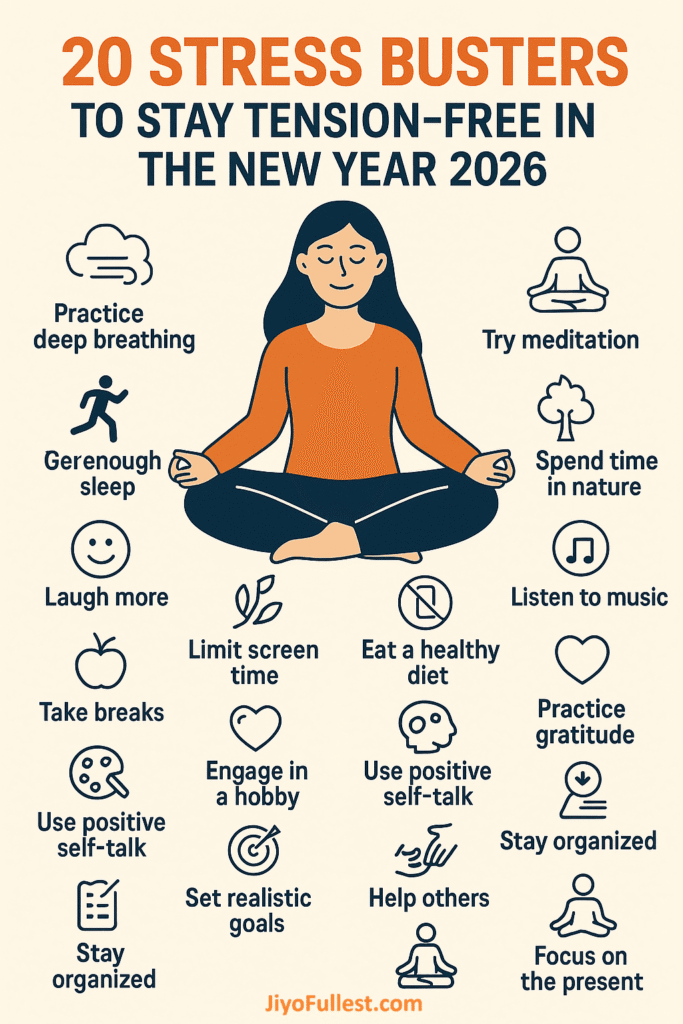The new year often brings excitement and optimism, but it can also come with stress from setting goals, balancing responsibilities, and navigating uncertainties. As we step into 2026, let’s prioritize mental and emotional well-being with these 20 stress busters that help you stay tension-free and focus on a healthier, happier life.
Table of Contents
Toggle20 Tips for Managing Stress in 2026
1. Practice Mindful Breathing
Take a few moments each day to focus on your breathing. Deep, slow breaths can calm your nervous system, reduce stress, and enhance focus. Try the 4-7-8 breathing technique: inhale for 4 seconds, hold for 7, and exhale for 8. You can practice Soma Breathing.
2. Declutter Your Space
A clutter-free environment promotes a clutter-free mind. Spend 10 minutes daily organizing your surroundings to create a calming space.
3. Start Your Day with Gratitude
Begin each morning by listing three things you’re grateful for. Gratitude shifts your mindset and helps you focus on the positives rather than the stressors. Listen Gratitude Voice that comes from within.
4. Stay Physically Active
Exercise releases endorphins, the body’s natural stress-relievers. Whether it’s yoga, jogging, or a quick home workout, physical activity boosts mood and lowers anxiety.
5. Set Realistic Goals
Break down your big goals into manageable tasks. Unrealistic expectations often lead to unnecessary stress, so be kind to yourself when setting resolutions.
6. Try Journaling
Write down your thoughts, feelings, and plans. Journaling can help process emotions, gain clarity, and track progress toward your goals.
7. Embrace Digital Detox
Constant notifications can overwhelm your mind. Dedicate time each day to disconnect from screens and reconnect with yourself or loved ones.

8. Practice Time Management
Stress often stems from feeling overwhelmed. Use tools like to-do lists, calendars, or apps to organize your tasks and prioritize effectively. Learn Time Management Strategy .
9. Indulge in a Hobby
Engaging in activities you love, like painting, reading, or gardening, helps divert your mind from stress and adds joy to your day. Suggested read: 50 cool hobbies for teens.
10. Laugh Often
Laughter truly is the best medicine. Watch a comedy, spend time with friends, or recall funny memories to instantly uplift your mood.
11. Spend Time in Nature
Nature has a calming effect on the mind. Take a walk in a park, sit by the beach, or simply enjoy fresh air to reduce stress levels. Check Nature’s Quotes.
12. Practice Meditation
Meditation trains your mind to stay present and reduces anxiety. Apps like Headspace or Calm offer guided meditations tailored for beginners.
13. Maintain a Healthy Diet
Foods rich in antioxidants, omega-3 fatty acids, and magnesium, like berries, nuts, and spinach, can help combat stress. Stay hydrated and avoid excessive caffeine.
14. Surround Yourself with Positive People
The company you keep has a significant impact on your mental health. Build relationships with those who uplift and support you.
Suggested Read: 7 positive thinking techniques that actually works

15. Set Boundaries
Learn to say no to demands that drain your energy. Respect your own needs and prioritize self-care without guilt.
16. Listen to Music
Music therapy is proven to reduce stress. Create playlists of your favorite calming or uplifting songs to play when you need a mood boost.
17. Get Enough Sleep
Adequate rest is essential for managing stress. Create a relaxing bedtime routine and aim for 7–9 hours of quality sleep each night. In a day time power naps also help.

18. Celebrate Small Wins
Don’t wait for big achievements to celebrate. Acknowledge and reward yourself for small victories, as they help build momentum and confidence.
19. Seek Professional Help When Needed
If stress feels unmanageable, don’t hesitate to reach out to a therapist or counselor. Professional support can provide valuable tools to navigate challenges.
20. Live in the Moment
Practice mindfulness by focusing on the present. Worrying about the past or future only adds stress—enjoy what’s happening now.
Also Read: When I leave my life over again.

Final Thoughts
As we embrace 2026, let’s focus on strategies that nurture our minds and bodies. Incorporate these stress busters into your daily routine and experience a year filled with balance, calmness, and joy. Here’s to a stress-free, fulfilling new year!
FAQs about Stress
How does eating healthy reduce stress?
Eating a balanced diet provides essential nutrients that regulate mood and energy, reducing stress naturally.
What is positive stress?
Positive stress, or eustress, motivates and energizes you to perform better in challenging situations.
What are cognitive symptoms of stress?
Cognitive symptoms include difficulty concentrating, memory problems, and negative thoughts.
Why am I so emotional right now?
Heightened emotions could be due to stress, hormonal changes, or lack of rest.
What is therapy for work stress?
Therapy for work stress involves counseling and techniques to manage triggers and improve workplace well-being.
What does it mean to feel depressed and overwhelmed?
Feeling this way often combines low mood with an inability to cope with daily demands.
What is overwhelmed depression?
It’s a state where feelings of sadness and stress make it hard to function or make decisions.
Are there fun stress relief activities for students in a PDF?
Yes, you can find PDFs with activities like mindfulness exercises, drawing prompts, and interactive games.
What is therapy for work-related stress?
It focuses on identifying stressors and developing coping strategies for workplace challenges.
What are stress management programs for employees?
These are initiatives by employers to teach stress reduction techniques and promote mental health.
Can you sue someone for causing stress?
In some cases, yes, if their actions caused intentional emotional distress or harm.
How do you answer ‘How do you handle stress’?
“I stay organized, prioritize tasks, and use relaxation techniques like deep breathing to manage stress effectively.”

